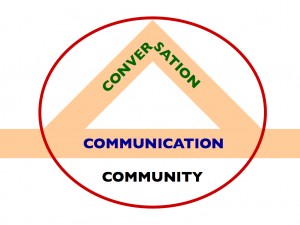Written by Joey Cope
Originally posted on peacebytes.org

When it comes to conflict, are your only two options fight or flight?
In a previous post, I encouraged you, whenever you find yourself in conflict, to continue to communicate with those around you — particularly those with whom you disagree. I defined communication as “the measured, yet free-flow, of information that results from discipline and control.”
This proactive behavior of communicating is essential in practically every aspect of our lives. It’s particularly necessary when we’re in conflict — at least those conflicts in which our desired outcome is continued relationship within or without our current environment.
Yet communication can be void of an essential element that is necessary to move individuals to a point where they can successfully manage the conflict. That element is trust and trust is what transforms communication into conversation.
CONVERSATION is the exchange of feelings, thoughts, and beliefs that lead to understanding.
You can readily see that without trust and the safety it brings to the table, feelings, thoughts, and beliefs will rarely be shared.
In separate conversations precipitated by a post on joeycope.com, I noted several comments where individuals were really trying to get a handle on the concept of conversation. Specifically, there was a good deal of interest in finding ways to initiate and maintain conversation when individuals were in essential disagreement over the topic at hand.
That article dealt specifically with our concept of sin. I promoted the point that sin can’t be debated. Behavior is either sinful or it is not. In other words, the identification of sin is a divine task. The difficulty comes when we, as moral and spiritual beings, try to determine what is and isn’t sin as we work toward a more righteous life. What if my understanding and subsequent belief differs from yours?
Dealing with elemental spiritual belief, conscientious individuals can’t simply take a stance that what others believe is unimportant if, indeed, we are concerned about the spiritual essence of others.
We have to come to an understanding. We must build a refuge of trust that allows for our feelings, thoughts, and beliefs to unfold, not only for others, but also for our own review and consideration.
In yet another post on peacebytes.org, I suggest that true conversation requires individuals to carefully choose a position on a topic, express it as clearly as possible, and then be prepared for the questions to come. When I enter the arena of public conversation, I have to ask you to trust me to be responsible with my opinion or belief. You, in turn, should expect my trust.
If you truly believe that I am wrong in my stated belief, nothing in the nature of conversation requires you to dilute or ignore your belief. And trust develops when the same is true for me. In fact, full knowledge of where others stand is a baseline for building trust.
At the same time, nothing about disagreement should necessarily cause the conversation to end. However, cyclical conversations with no added insight or information tend to breed frustration. And frustration often precipitates a desire to control or to win. When winning seems remote, the conversation ends with serious negative consequences.
So what do we do in these situations? How do we continue in productive conversation?
- We continue to ask thoughtful questions that can help us understand one another.
- When presented with a thoughtful question, we value the opportunity, we soberly craft a respectful answer that reveals additional insight into our position, and we invite further questions.
- When we are at a loss on what else to say to move our conversation, we find different topics of conversation that build relationship and community.
- Within community, we often can return to those more difficult conversations.
In my work as a mediator, I naturally direct parties towards conversations about disagreements in the same manner as outlined above. We continue to ask the “why” questions as we seek to understand the underlying interests. We work hard to hear the answers to those questions. And, when we get stuck, we spend time concentrating on the common ground between us — the things we agree on — to explore the possibilities of doing some good as fellow travelers in this life. With the feeling of community that emerges, we often find the keys to better understanding on even the most divisive of issues.
And tremendous opportunity exists side-by-side with understanding.
It’s often said that people don’t like change. That simply isn’t true. We all like change. We just don’t like to be changed by someone else. Conversation — purposeful, friendly, and open — presents both me and you the opportunity to reflect and, if needed, change.
I’m involved in a lot of conversations. Many of them are with people I disagree with on matters both large and small. At the end of the day, I count success not by the number of people I have persuaded, but by the number of those who will return to the conversation tomorrow.
Leave a Reply